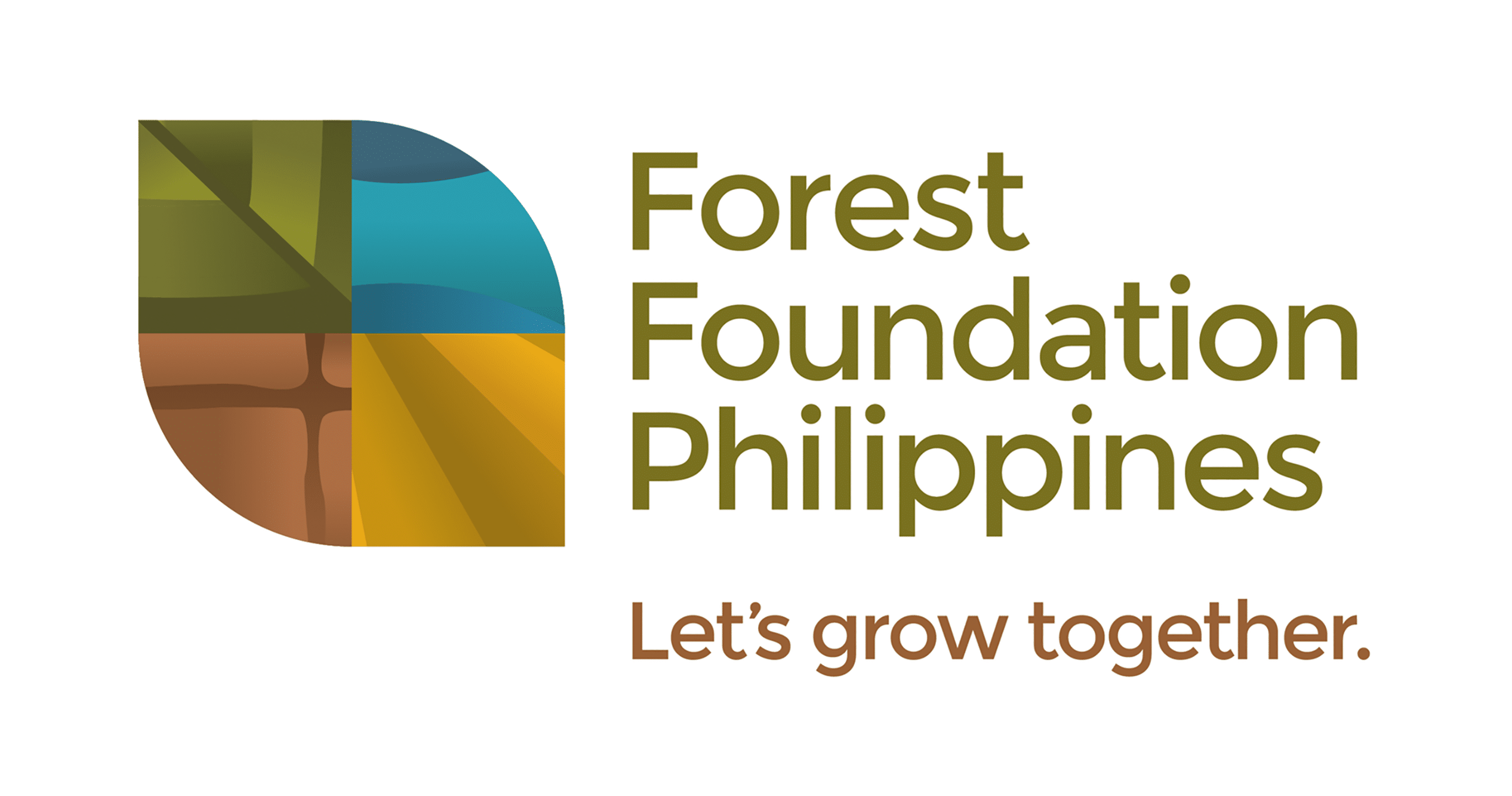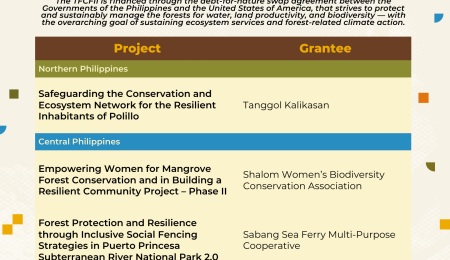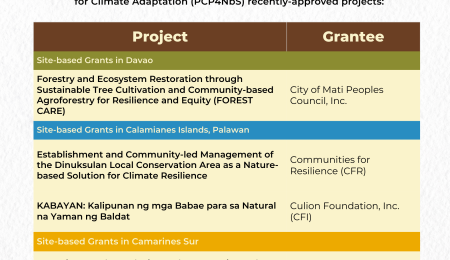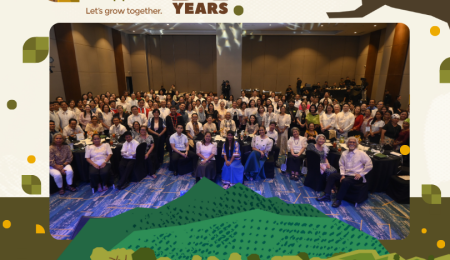Leaders and representatives from government, civil society, local communities, development organizations, and the academe gathered at the PUNLA: Multistakeholder Nature-based Solutions Forum in Quezon City on September 9–10. Co-organized by the Department of Environment and Natural Resources (DENR), Forest Foundation Philippines (FFP), and the Government of Canada, the forum aimed to build a shared understanding of high-integrity Nature-based Solutions (NbS) to address climate, biodiversity, and societal challenges in the Philippines.
Manila, Philippines — Forest Foundation Philippines (FFP), with the Department of Environment and Natural Resources (DENR), and the Government of Canada, convened leaders and members of the government, civil society and development organizations, local communities, and the academe at the PUNLA Multistakeholder Forum on Nature-based Solutions on September 9–10 in Quezon City, to build a shared understanding of high-integrity Nature-based Solutions (NbS).
The Forum underscored NbS as vital for restoring ecosystems while addressing climate, biodiversity, and social challenges in the Philippines, highlighting the need for stronger national understanding and cross-sector coordination. Jake Brunner, Head of the Lower Mekong Subregion of the International Union for Conservation of Nature (IUCN), said that effective NbS must tackle societal challenges, work within ecosystems, and deliver measurable benefits for people and nature.
Integrating NbS in National Planning
To embed NbS in national policies, the DENR has convened a multistakeholder Nature-based Solutions (NbS) Support Network to collectively define priorities and actions towards institutionalization of high-integrity NbS initiatives within the agency. With partners from the academe, civil society, local communities and development partners, beginning with the PUNLA: NbS Forum, the group aims to develop a shared understanding of NbS, enable actionable commitments and follow-up mechanisms to ensure sustained collaboration, implementation, and institutionalization of NbS in the country.

Members of the Nature-based Solutions Support Network (NbS Support Network) pledge their support to drive actionable commitments for NbS in the country. Photo from FFP.
Forest Foundation Philippines’ Philippines–Canada Partnership on Nature-based Solutions (NbS) for Climate Adaptation (PCP4NbS) was highlighted as a model of inclusive, community-led actions across six climate-vulnerable, biodiversity-rich areas that blend traditional knowledge, local leadership, and science. Edwina Garchitorena, Chair of the Board of Trustees of FFP, stressed that NbS bridges environmental and development goals, and that strong collaboration with partners is essential to institutionalizing them.

Co-led by the Foundation, DENR, and the Government of Canada, PUNLA highlighted the importance of high-integrity NbS in restoring ecosystems and strengthening resilience for people and nature in the Philippines. [L-R: Atty. Jose Andres Canivel, Executive Director, Forest Foundation Philippines; Atty. Alaya M. de Leon, Deputy Executive Director, Forest Foundation Philippines; Edwina Garchitorena, Chair, Board of Trustees, Forest Foundation Philippines; Mr. Simon Snoxell, Head of Cooperation at the Embassy of Canada to the Philippines; Jake Brunner, Head of Lower Mekong Subregion, International Union for the Conservation of Nature; Dr. Noralene Uy, Assistant Secretary for Policy, Planning, International Affairs and Climate Change, Department of Environment and Natural Resources; and, Dr. Dixon Gevaña, Director, Forestry Development Center)
Mr. Simon Snoxell, Head of Cooperation and Counsellor (Development) at the Embassy of Canada to the Philippines echoed the same statement. “This multi-sectoral collaboration builds on local solutions, showing how scaling community-driven efforts can strengthen resilience for both people and ecosystems nationwide.”

PUNLA marked a milestone in global-local alignment with the launch of the IUCN National Committee Philippines, which will localize global conservation frameworks and amplify the country’s voice in international environmental policy. [L-R: Arlie Jo Endonila, Chief Operating Officer, Haribon Foundation and Chair, IUCN National Committee Philippines; Atty. Jose Andres Canivel, Executive Director, Forest Foundation Philippines; Gigi Merilo, Senior Environmental Management Specialist, Department of Environment and Natural Resources – Climate Change Service; Edwina Garchitorena, Chair, Board of Trustees, Forest Foundation Philippines; and, Jake Brunner, Head of Lower Mekong Subregion, International Union for Conservation of Nature] Photo from FFP.
The PUNLA 2025 Forum also marked a milestone in global-local alignment with the launch of the IUCN National Committee Philippines. Comprising IUCN members in the Philippines, the committee aims to localize global conservation frameworks and amplify the country’s voice in international environmental policy. “The committee connects Philippine efforts with global NbS and biodiversity targets while adapting international standards to local realities,” Garchitorena added.
Responding to converging climate and social risks
In the Philippines, 74% of the population faces climate-related threats, and the country holds the highest natural disaster risk globally, with a 2024 World Risk Index score of 46.91%. Forum discussions underscored how these risks are especially acute for Indigenous and rural communities, where degraded ecosystems weaken food systems, water access, and disaster resilience.
As Dr. Dixon Gevaña, Director of Forestry Development Center, University of the Philippines Los Baños said, NbS emerges as a critical pathway to restore natural defenses, and eventually strengthen social equity. “If we are to build lasting resilience, we must restore the ecosystems that sustain us while empowering the communities that depend on them,” he added.
Towards a sustainable, and climate-resilient nation
Panelists and community representatives reiterated integrating Indigenous and local knowledge, community practices, and evidence in NbS design and implementation, highlighting gender-responsive, youth-led, and community-driven approaches. They called for innovative financing, inclusive governance, and strong partnerships to scale and sustain these initiatives.“Ongoing collaboration across all sectors is essential to build a resilient and inclusive Philippines that can effectively respond to the nation’s most urgent climate and social challenges,” said Atty. Ray Thomas Kabigting, Assistant Director of the DENR’s Forest Management Bureau.
As environmental and social risks escalate, the Foundation, the DENR, and its partners remain committed to strengthening efforts to institutionalize and scale NbS to build lasting resilience for the country.




